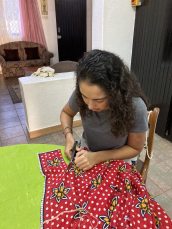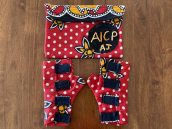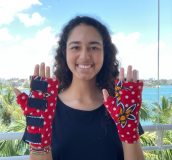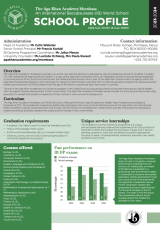Academy student creates affordable wrist splint for children with cerebral palsy
 Alyssa Jamal cutting a piece of cloth to make the wrist splints.Alyssa Jamal is a Year 10 student at the Aga Khan Academy Mombasa whose personal project, ‘Assistive Innovations for Cerebral Palsy’, focused on creating an affordable wrist splint for children with cerebral palsy with the aim of making their day to day lives easier. Wrist splints are designed to stabilise and straighten the hand and wrist thus improving the functionality of the upper limb. She also made a customised bag with which to carry the splint.
Alyssa Jamal cutting a piece of cloth to make the wrist splints.Alyssa Jamal is a Year 10 student at the Aga Khan Academy Mombasa whose personal project, ‘Assistive Innovations for Cerebral Palsy’, focused on creating an affordable wrist splint for children with cerebral palsy with the aim of making their day to day lives easier. Wrist splints are designed to stabilise and straighten the hand and wrist thus improving the functionality of the upper limb. She also made a customised bag with which to carry the splint.
 Alyssa Jamal sewing the wrist splints.To make these wrist splints accessible to marginalised communities in Mombasa, Kenya, Alyssa decided to use cheap and locally available materials. This, she said would help bridge the gap between the privileged and disadvantaged in society as she firmly believes that development can only be fully realised if there is equality.
Alyssa Jamal sewing the wrist splints.To make these wrist splints accessible to marginalised communities in Mombasa, Kenya, Alyssa decided to use cheap and locally available materials. This, she said would help bridge the gap between the privileged and disadvantaged in society as she firmly believes that development can only be fully realised if there is equality.
 The wrist splints and a customised bag with which to carry them.“My product will help marginalised kids with cerebral palsy, most of whom cannot afford these splints, to have access to affordable hand splints which they need along with physical therapy,” Alyssa stated.
The wrist splints and a customised bag with which to carry them.“My product will help marginalised kids with cerebral palsy, most of whom cannot afford these splints, to have access to affordable hand splints which they need along with physical therapy,” Alyssa stated.
Alyssa’s altruistic journey started in Year 4 when she and her fellow students visited a special needs and therapy center for a school trip as part of the unit, ‘Rights and Responsibilities’, which they were studying at the time. It was here where she learnt about cerebral palsy and developed a passion for community service and her keen interest for raising awareness for children with disabilities. “I started to volunteer at the center, spending time with the children; reading them stories, painting, designing pots and making sequential art,” said Alyssa. “What inspired me the most is that whenever I went to see these children, they were always happy.” This would eventually motivate her to focus her Primary Years Programme (PYP) Exhibition on raising awareness about cerebral palsy.
 Alyssa Jamal with the splints.For Alyssa, her project goes beyond making an assistive tool for children with cerebral palsy. It is about making a difference so that they can lead normal lives. In fact, while making a prototype of the wrist splint, it was important for her to get feedback from the parents of the child she had made it for. This, she said would allow her to make improvements in the future so that it is suitable for every child who will use it.
Alyssa Jamal with the splints.For Alyssa, her project goes beyond making an assistive tool for children with cerebral palsy. It is about making a difference so that they can lead normal lives. In fact, while making a prototype of the wrist splint, it was important for her to get feedback from the parents of the child she had made it for. This, she said would allow her to make improvements in the future so that it is suitable for every child who will use it.
Sabrina Natha, a parent whose child uses the hand splint made by Alyssa and trustee at the Sapling Trust Center, expressed her gratitude saying:
“We truly appreciate this noble project which seeks to help children with special needs, especially those from underprivileged backgrounds. The splints have definitely helped my son as part of his daily therapy routine. They are of high quality and serve the intended purpose.”
Alyssa now plans to take this project a step further by establishing a creativity, activity, service (CAS) group when she joins the Diploma Programme. “With the help of other students, I will be able to make more of these hand splints and support the local communities in Mombasa,” Alyssa said.





